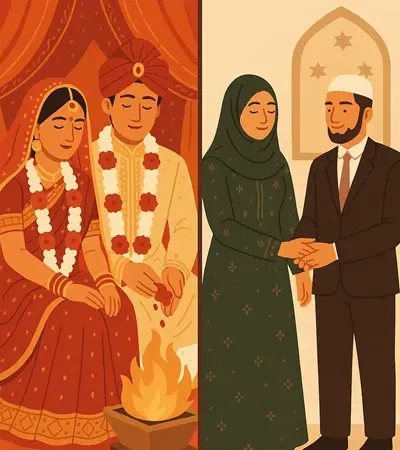
Hindu Marriage (HMA, 1955)
Marriage that is considered sacramental and is governed by the Hindu Marriage Act of 1955.
Under Section 5, the requisites comprise monogamous relationships, sound consent, and age (males ≥ 21 years, females ≥ 18 years) and no prohibited relations.
Registration is not compulsory, but it can be done in compliance with state rules.
Muslim Marriage
Treats as a civil contract via ijab and qubool, with witnesses and assumed to be under puberty at 15; governed by Muslim personal law and related statutes. (Not codified under central family law).
Registration is not mandatory; validity depends on fulfilling religious requirements.
Court Marriage (Secular, under SMA, 1954)
Available for all religions without conversion. Civil contract, no rituals required.
File notice 30-days prior, public display, solemnisation with Marriage Officer + three witnesses, and certificate being issued by Registrar.
Registration Fees (Approximate)
| Marriage Type | Approx. Application Fee | Additional Fees (Stamp/Solemnisation) |
|---|---|---|
| Hindu Marriage Act | ₹100 | Usually minimal. State-specific. |
| Special Marriage Act/Muslim Marriage | ₹150 | Stamp duty: ₹100–200; certificate fee: ₹100–500; govt total: ₹500–1,500 |
Required Documents
Hindu Marriage Registration (state-level general requirements)
- Application in Form A
- Proof of age (SSC certificate or passport) for both parties
- Residential proof of either spouse
- Wedding invitation card and ceremony photograph
- Three witnesses for form and register signatures
Municipal/Delhi (example)
- Completed application form, signed by both
- Fee: ₹100
- Date of birth: Matric/passport/birth certificate
- Address proof: Voter ID, ration card, driving license, passport
MP e-Nagar (example)
- 4 passport-size photos (each)
- Birth certificate or fill-up mark sheet
- Wedding card and photo of ceremony
- Declaration of delay (>21 days), priest certificate if applicable
- IDs of both parties and parents, two witnesses, thumb impressions, and a webcam photo
Special Marriage (civil)
- Identity and address proof (e.g., ration card, passport, driving licence, voter ID, bank passbook)
Table of differences between Hindu Marriage and Muslim Marriage
| Aspect | Hindu Marriage | Muslim Marriage |
|---|---|---|
| Nature | Sacrament (samskara) – sacred, lifelong union | Civil contract – based on offer (ijab) and acceptance (qubool) |
| Governing Law | Hindu Marriage Act, 1955 | Muslim Personal Law (Shariat) Act, 1937; Dissolution of Muslim Marriages Act, 1939; Muslim Women (Protection of Rights on Divorce) Act, 1986 |
| Conditions | Monogamy, sound mind, legal age (21 groom, 18 bride), not in prohibited degrees | Proposal and acceptance in one sitting, presence of witnesses, both of sound mind and puberty (15 yrs), no prohibited relationship (unless permitted by law) |
| Polygamy | Prohibited (bigamy punishable) | Permitted for men (up to 4 wives) with conditions of equal treatment; not permitted for women |
| Age of Marriage | 21 (male), 18 (female) – as per Hindu Marriage Act + Child Marriage Prohibition Act | Puberty (≈15) under personal law, but legally overridden by Child Marriage Prohibition Act → 21 (male), 18 (female) |
| Divorce | Only through court on specific grounds (adultery, cruelty, desertion, etc.) | Judicial or extra-judicial: talaq (husband), khula (wife), mubarat (mutual), plus court divorce under the 1939 Act |
| Registration | Not compulsory everywhere, but advisable; some states mandate | Registration not essential; validity depends on religious procedure, though some states require registration |
| Dowry/Property | Stridhan – woman’s absolute property | Mehr (dower) – mandatory payment to wife at marriage |
| Remarriage | Permissible after divorce or death of spouse | Permissible after divorce or death; a woman must observe the iddat period before remarriage |
| Court Marriage Option | Possible under Special Marriage Act, 1954 | Possible under the Special Marriage Act, 1954 |
FAQs
-
Q1: Can Hindus and Muslims both go for court marriages?
-
Yes. Under the Special Marriage Act, 1954, either person from any religion may marry without conversion, including Hindus or Muslims. It is with respect to notice, a waiting period of 30 days, solemnising by the Registrar, and issuance of a certificate.
-
Q2: Are personal religious marriages valid without registration?
-
Yes, as long as the rituals are in accordance with personal law. But, for legal recognition (e.g., passport, visa, inheritance), it is recommended that the marriage be registered under state law.
-
Q3: The age requirements do differ per religion?
-
No. The Child Marriage Prohibition Act sets the same legal minimum: male ≥ 21, female ≥ 18. Religious ceremonies conducted below that age would be either voidable or illegal.
-
Q4: What fees would apply?
-
Hindu Marriage Act: 100 rupees (may vary by the state).
Special Marriage Act: 150 rupees for the application plus stamp and certificate would total 500–1,500 rupees.
Muslim: state-dependent, ~200 rupees approximately. -
Q5: A summary of required documents
-
Age proof (SSC, passport, birth certificate).
Address proof.
Identity proof.
Marriage proof (invitation, ceremony photo).
Witnesses.
For SMA: An Affidavit and proof as above are required additionally. -
Q6: Any state-specific requirements (for UP)?
-
In UP, video evidence of the ceremony has become compulsory, coupled with a notarised affidavit from the priest as a witness; proof of residence has tightened as well. Although, if either family corroborates, exemptions apply.
Add new comment